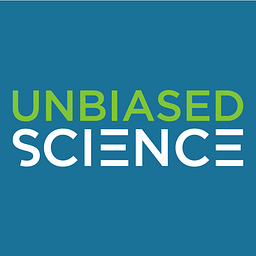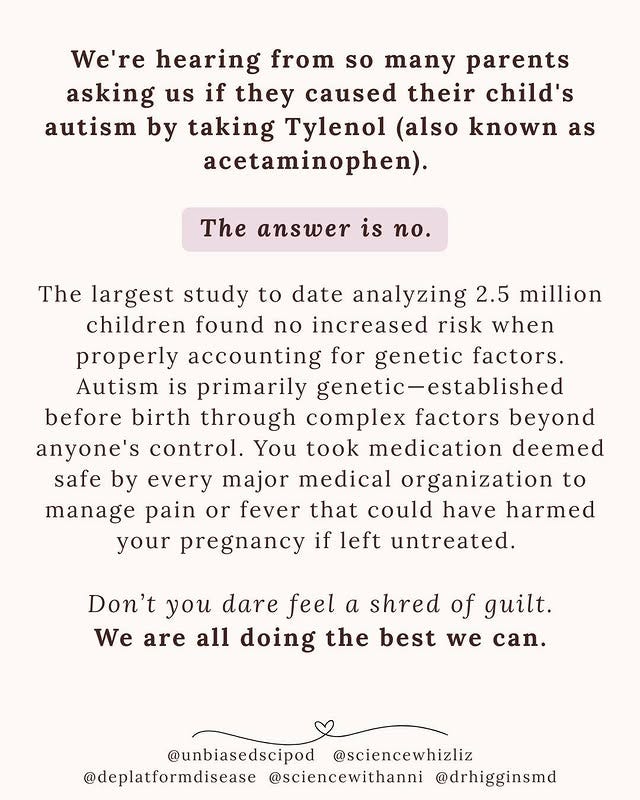The Day Our Government Told Mothers They Caused Their Children's Autism
Description
In my last article, I used the parallel to the Seven Dwarfs to capture my sentiments watching the ACIP meeting unfold. Unfortunately, I can't muster up much levity right now. Yesterday's press conference on autism made me feel immense sadness, anger, and fear. Is there a darker dwarf spinoff?
At times, I had to remind myself that, no, this was not a Saturday Night Live skit. These were our nation's federal health leaders, standing up on a podium, broadcasting to the entire world that mothers caused their children's autism, that pregnant women should tough out fevers, that we are pumping our kids with scary chemicals that their bodies can't handle, and so many more falsehoods that I genuinely lost count. Perhaps it sounds dramatic, but the reality is that I watched with my jaw on the floor and tears streaming down my face.
My fellow science communicators and I were flooded with questions from moms riddled with guilt, pregnant women riddled with fear and anxiety, and autistic people who felt caught in the crossfire. I discussed this on ABC News yesterday, but I wanted to expand on what we're telling families. So a group of us put together some messages that I thought we'd share here (shoutout to Dr. Liz Marnik, Edward Nirenberg, Dr. Annicka Evans, and Dr. David Higgins).
The Messages That Need to Be Heard
To Parents Drowning in Guilt
We're hearing from so many parents asking if they caused their child's autism by taking Tylenol (trade name of a medicine that contains acetaminophen). The answer is no.
The largest study to date, which analyzed 2.5 million children, found no increased likelihood when properly accounting for genetic factors. Autism is primarily genetic—established before birth through complex factors beyond anyone's control. If you took acetaminophen, you took a medication that is deemed safe by every major medical organization for the management of pain or fever during pregnancy (things that could have potentially harmed your pregnancy if left untreated).
This is not your fault. Each of us does the best we can with the information we have at the time—and the data say that you did nothing wrong and, in fact, potentially protected your baby from the harmful effects of a fever in pregnancy.
To Pregnant Women Being Told to "Tough It Out"
You do NOT need to "tough out" a fever during pregnancy. Unlike the disputed claims about acetaminophen, the risks of untreated fever during pregnancy are well-established. Fevers above 100.4°F in the first trimester are proven to increase the risk of adverse birth outcomes. This is well-established science with decades of evidence—not speculation.
A 2014 systematic review and meta-analysis published in Pediatrics found that maternal fever was associated with an increased risk of several adverse birth outcomes: nearly a threefold higher risk of neural tube defects (OR=2.90, 95% CI: 2.22-3.79), almost double the risk of oral clefts (OR=1.94, 95% CI: 1.35-2.79) and 1.5 times the risk of congenital heart defects (OR=1.54, 95% CI: 1.37-1.74). In addition:
With one exception, most reviewed studies concluded fever severity (e.g., highest temperature reached) did not change the risk of these outcomes.
In most cases, the use of anti-fever medications (like acetaminophen) actually removed the risk of adverse birth outcomes due to maternal fever.
While debates continue about acetaminophen's theoretical risks, letting a high fever go untreated poses known, immediate dangers to your pregnancy. Talk to your OB/GYN about safe treatment options.
To the Autistic Community
You are valuable, loved, and important members of our society whose neurodiversity enriches our world. We are deeply sorry that your lives and experiences are being exploited to spread lies and fear. You deserve respect, acceptance, and support. You deserve not to be used as pawns in political theater that ignores your voices while claiming to speak for you.
Autism isn't a tragedy—the constant dehumanization and devaluation of autistic people is.
What the Science Actually Says
A comprehensive briefing from science communicators is forthcoming, but I wanted to share what we know now:
About Acetaminophen and Autism
The centerpiece of the administration's claims appears to be a review of studies on acetaminophen taken during pregnancy. But as I explored in my previous analysis, the evidence is far from conclusive:
The Swedish study of 2.5 million children initially found small associations (5-7% increased likelihood), but these completely disappeared when comparing siblings. (An association in science simply means that there seems to be some kind of connection between two things- it does NOT mean that one thing causes another. There could be a third thing that caused both of the first two, which is known as a confounder.)
In the sibling analysis, there was no dose-response effect—kids exposed to high doses had the same autism rates as unexposed kids. If there were an actual link between acetaminophen and autism, we would expect the probability of having autism to increase with increasing levels of exposure to acetaminophen.
The centerpiece of the administration's claims appears to be a systematic review of 46 studies examining acetaminophen use during pregnancy and neurodevelopmental outcomes. This review, published in Environmental Health in August, compiled studies with wildly different methods, populations, and ways of measuring both exposure and outcomes—making it impossible to perform a proper meta-analysis where data could be meaningfully combined. The review authors themselves stated they "cannot answer the causation question.
The fundamental issue here is that association is not causation. When genetics is properly accounted for, the supposed link vanishes. As autism experts explained in the New York Times roundtable, the review paper's author served as an expert witness in acetaminophen litigation, and his testimony was excluded by the judge for being "scientifically unsound."
Both the American College of Obstetricians and Gynecologists (ACOG) and the American Academy of Pediatrics (AAP) released strong statements yesterday. ACOG emphasized that "in more than two decades of research on the use of acetaminophen in pregnancy, not a single reputable study has successfully concluded that the use of acetaminophen in any trimester of pregnancy causes neurodevelopmental disorders in children." The AAP called the White House event "filled with dangerous claims and misleading information."
About Folate and Leucovorin
Dr. Kevin Klatt provided an excellent primer on the folate-autism hypothesis that I want to simplify here:
The administration is promoting leucovorin (folinic acid) as an autism treatment based on the idea that some autistic children might have "cerebral folate deficiency"—low folate specifically in the brain despite normal blood levels.
The reality?
Only a handful of small trials have been conducted, with 80 or fewer participants.
Effects, when found, were generally modest.
Leucovorin has never been tested head-to-head against other forms of folate.
The doses used are much higher (about 10-100 times higher) than the normal dietary intake.
The proposal of leucovorin as a treatment would only theoretically work for a small subset of autistic people with an antibody against the fo






